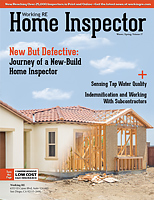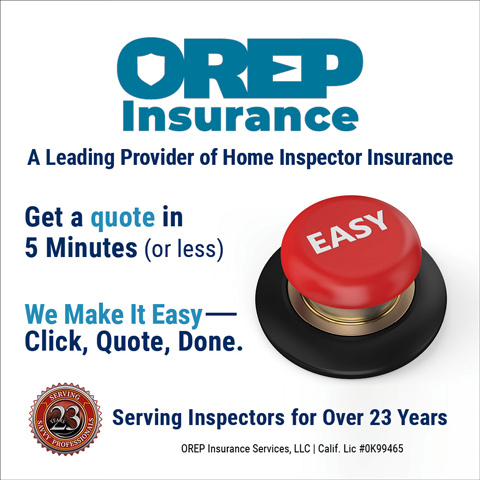 | > E&O/GL Insurance for Home Inspectors Competitive Rates, Broad Coverage, Free Risk Management, online inspection support for tough questions, discounts on education and more… Professional Coverage, Competitive Pricing Shop OREP today! |
Why Customer Reviews Matter
by Kendra Budd, Editor
The reviews are in—and they matter immensely! Believe it or not, clients look at the reviews that are posted about your business and they may greatly affect the future of your work.
Great reviews can propel your business into financial prosperity, while bad reviews can plummet its success altogether. (Especially with the rise in power of social media!) Instead of just letting negative reviews sit though, you can use them to better your business practices. In fact, criticism can help a business look at the parts in which your business could improve.
The truth is, both good and bad, reviews are good for business when you know how to use them to your advantage.
Why Reviews Matter
So how do reviews actually affect the standing of your business? Well, the truth of the matter is that clients read them and are inclined to trust them. In fact, clients actively research reviews. According to the Harvard Business Review, 98 percent of customers look at reviews before making a purchase.
Customers trust reviews to the point that it can affect your revenue. “[In] 2021, online reviews were predicted to affect $3.8 trillion revenues worldwide,” the Harvard Business Review found. This isn’t just simply because people get bad reviews per se, but it can also be affected by a lack of reviews. This means that if you don’t have online review site listings or a minimal amount, then you will not be getting a client’s business. If you can’t be found online, then you won’t be found at all.
When you look up a service on a search engine, odds are you are going to be recommended businesses with a plethora of positive reviews at the top of your search, while businesses with few reviews (positive or negative) will fall toward the bottom. Customers will be more likely to pick a business that comes up on the first page of a search, especially if it has an abundance of positive reviews. So, if your business doesn’t have reviews, then odds are clients aren’t even seeing it come up in a search.
Don’t Ignore Reviews
So, with this information, why do business owners choose to ignore or not utilize reviews more? Well, some feel like they don’t matter or that they are too busy to take the time to look at them. So, oftentimes, business owners will just reply to reviews with a generic response or not reply at all. This is turning future clients away!
When you ignore a review, you are telling clients you don’t care about them, that you’re not interested in improving your services, and worst of all that you are not listening to them. You are showing that you only care about making money, and not client interaction. Markets are saturated and you never want to fool yourself into believing that your services are good enough to stand on their own. Treating your clients as a means to make money is a surefire way to shoot yourself in the foot with even more negative reviews.
It is also imperative that you respond to reviews quickly and efficiently. If you’re not able to set aside time to respond to reviews daily, then you at the very least need to be doing it weekly. The longer you leave a review, especially a negative one, unchecked, then you’re inviting more time for other clients to see that review. This can even frustrate the customer to the point of them leaving more negative reviews due to your lack of response. Sometimes, your clients just need to know that they’ve been heard.
(story continues below)
(story continues)
How to Respond to Reviews
As mentioned before, you never want to respond to reviews with a generic message. You want to take the time to analyze every single review and respond accordingly. People will start to notice if you’re using the same script in your responses, and it will turn them off to your business. However, if you’re responding differently every time while still holding respect, then clients will be more drawn to your business because they’ll know their concerns will be heard. This isn’t to say you can’t have automated responses in certain circumstances of course, but more on that later.
So, once you have taken your hour to sit down and respond to reviews, you’ll want to remember these tips:
- Tame Your Ego
It can be easy to just want to defend yourself and your business when receiving a negative—but don’t. Even if the review isn’t justified, your response is what clients will remember when considering your business in the future. Remember, at the end of the day that this person doesn’t actually know you or your work ethic, and it’s best not to take things personally. Always read reviews from a business standpoint. - Analyze
Take the time to really read the review. What is the client actually trying to say? In fact, it’s best to read the review twice. Sometimes what could come off as a negative review, could actually be a positive one—sometimes that second glance at it will clear up any confusion. Ask yourself what the best approach will be with this particular client, and if the review is justified or fixable. - Be Personable
Clients love it when you remember them and your interaction together. Always greet them by name when responding, and thank them for the feedback. Restate their review in new words so they can feel as if you’re really hearing them—especially if it’s negative. Let them know that you take their feedback seriously and that you understand them and are actually glad if they raised an issue. - Answer Questions
This is the only time you should use an automated response to reviews. Sometimes, clients or prospective customers will use your review tool to ask questions about your business. If you notice you keep getting the same questions, then having a pre-written response is a great way to get that “review” out of the way by answering the question efficiently and properly. - Stick to the Point
Finally, when you’re responding to a review, it is best to keep the message short and simple. Including too many details can be overwhelming to the client and make you seem desperate. This can be true when responding to both negative and positive reviews. You don’t want to ask follow-up questions in your response, either. If you need additional information about a review, offer the client an opportunity to call your office to discuss the matter further and in more detail. - Learn From the Negative
Remember, negative reviews can actually uncover insights that can help you improve your business. Ask yourself how you can improve future interactions with clients. It’s important to act when receiving consistent feedback about where improvements can be made, rather than just brushing them under the rug. Always let the reviewer know that you appreciate the feedback so that you may improve.
The more you take the time to respond to reviews, the less scary they become. Plus, you’ll come off as more professional and personable to future clients. It will show your clients that you do care about their feedback and take it to heart. You’ll soon learn that you need reviews to thrive as a business—both the positive and negative ones.
(story continues below)
(story continues)
How to Get More Reviews
Despite reviews being a great way for you to build your reputation, many business owners find themselves too afraid to ask for them. Too many fear negative reviews, but the truth is that you are more likely to get a positive review if you ask for a review at all. People who leave negative reviews are going to leave them no matter what, but oftentimes, people who had a positive experience will only leave one if they are prompted to.
There is an art to review-solicitation that can shine a more positive light. First, you want to ensure you’re asking for reviews at the right time. The best time to send the email is around one hour after the service is complete. This gives time for the client to think more on their experience. Asking any later could give too much time for the positive experience or memories to wear off.
Next, you want to ensure you’re getting the wording right before sending the email. Don’t say something along the lines, “If you’re satisfied, please leave us a review online.” This wording may make the client feel like they can only give positive feedback, making them feel like their opinion doesn’t truly matter to you. Instead, say something along the lines of, “You’ll receive an email shortly asking about your experience today. We’d really appreciate it if you took a couple of minutes to let us know how we did!” This invites the client directly and doesn’t pressure them to give feedback that they think you are expecting.
Keep everything simple. The more steps it takes to leave a review, the less likely customers will do it. Offer direct links in the email to where they can review your business. If they have to search for it or answer too many questions in a survey, they’ll abandon the venture halfway through. The simpler, the better.
Final Thoughts
Reviews are a great tool to help improve and build your business’s success. There is no need to fear a negative review as long as you are taking the proper steps to mitigate and solve them. In fact, you should be welcoming all reviews. The more reviews you have, the more business you are bound to get because you are more likely to show up on search optimization websites such as Google. Remember, clients actively search for and trust other reviews, so it is not something to ignore or brush under the rug if you get a negative one.
Instead of fearing customer reviews, start viewing them as opportunities for improving your business and to connect with your clients more. You just need to know how to wield them to your advantage. Stay safe out there!
About the Author
Kendra Budd is the Editor of Working RE Magazine and Marketing Coordinator for OREP Insurance. She graduated with a BA in Theatre and English from Western Washington University, and with an MFA in Creative Writing from Full Sail University. She is currently based in Seattle, WA.
OREP Insurance Services, LLC. Calif. License #0K99465



